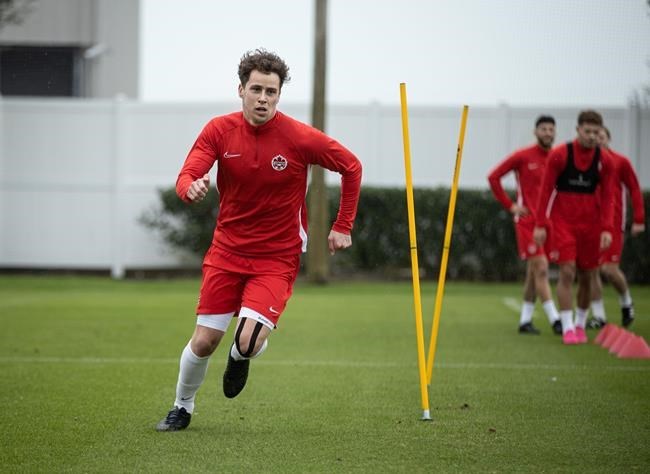Frank Sturing enjoyed his first camp with the Canadian soccer team. Now the Dutch-born defender hopes he made a good enough first impression to get invited back.
Visiting Canada for the first time is also on his to-do list.
The 23-year-old calls the Netherlands home but qualifies to play for Canada through his Calgary-born father. Sturing's Dutch grandparents moved to Canada but returned home when his father was four or five.
"It's a big honour for me and I'm grateful for this opportunity," Sturing said of being invited by Canada coach John Herdman to camp last month in Bradenton, Fla. It marked his first trip outside of Europe.
"I always wanted to go to Canada during holidays," he said. "But it's not easy to come when you have two weeks off or something, because I always wanted to go with my father back to Canada. Hopefully I can come soon."
Herdman says Sturing is a player who "flew under the radar."
"Just a young pro who's showing he could be someone Canada needs in the future," he said.
Sturing took time away from his club team Den Bosch to join Canada, having it written into his contract that he be allowed to attend Canadian camps.
"It was an easy decision for me because it's a huge opportunity to show myself," he said.
Sturing reports his father and grandparents are "really proud" he has chosen to wear Canadian colours. That wasn't always the case. Sturing represented the Netherlands at the U-18, U-19, U-20 and U-21 levels.
Competition to make the Dutch national team is fierce and he found himself often on the team standby list. Plus the Dutch have plenty of star options at centre back with the likes of Liverpool's Virgil van Dijk, currently injured, leading the way.
"I think the Netherlands has the best centre backs in the world," said Sturing. "So at some point you have to look at your opportunities. I think my opportunities are better with Canada. That's why I was really up to represent Canada now. I'm really proud of it."
He got his Canadian passport last March and his transfer of international soccer allegiance is complete.
"It's all official now," he said.
Given his age, Sturing is also eligible to represent Canada at the CONCACAF Olympic qualifying tournament set for this March. He was part of the squad selected for the event last March only to see it postponed until 2021 due to the pandemic.
The Canadian men have not made the Olympics since 1984 when they lost to Brazil in a quarterfinal penalty shootout.
Sturing came up through the NEC academy ranks in his hometown of Nijmegen, eventually making it to the first team. He played in both the Dutch first and second divisions before moving to second-tier Den Bosch last October when his contract expired.
He has been a regular starter at Den Bosch, which is currently 19th in the 20-team league at 2-13-7. Injuries, COVID-19 and some bad luck have taken their toll at the club, he says.
"It's not going really well … Hopefully we can turn it around and have a better second half of the season," he said.
Sturing is right-footed but plays left centre back for his club.
"I'm comfortable with the ball … I think that's one of my big strengths — to make good decisions with the ball," he said. "My position, most of the time, is good in defence."
He also spent some time as a defensive midfielder as a youth but prefers the backline.
His two brothers and father all played amateur soccer. Herman Sturing, his father, also investigated playing for the Canadian Olympic team in the early '80s and "he was close to (making) it," said Frank.
The Dutch leagues cancelled their season in March when the first lockdown hit. The new season started in September.
Sturing, who lives with his family, isn't alone in pulling on a Canadian shirt without having set foot in Canada.
Marc Bircham, an English-born midfielder who qualified to play for Canada by virtue of a Winnipeg-born grandfather, scored for Canada before ever coming here. He scored on his Canada debut in Belfast against Northern Ireland on April 27, 1999.
---
Follow @NeilMDavidson on Twitter
This report by The Canadian Press was first published Feb. 1, 2021
Neil Davidson, The Canadian Press
